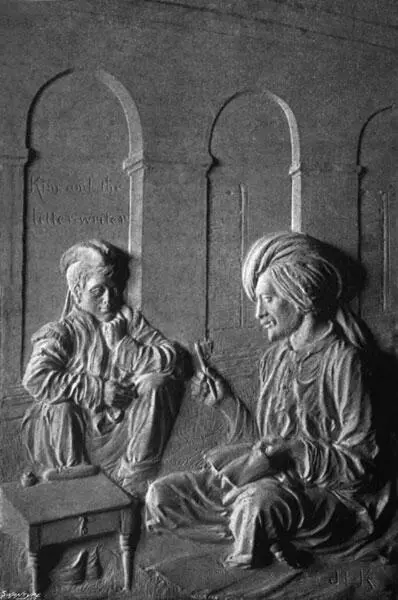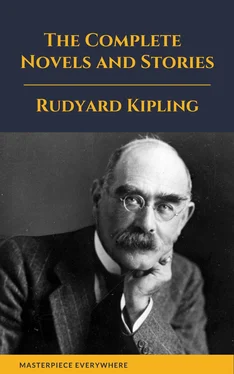‘I do not know anything. Go away!’ said Kim, scenting evil. Hereupon the man caught him by the ear, dragged him to a room in a far-off wing where a dozen drummer-boys were sitting on forms, and told him to be still if he could do nothing else. This he managed very successfully. The man explained something or other with white lines on a black board for at least half an hour, and Kim continued his interrupted nap. He much disapproved of the present aspect of affairs, for this was the very school and discipline he had spent two-thirds of his young life in avoiding. Suddenly a beautiful idea occurred to him, and he wondered that he had not thought of it before.
The man dismissed them, and first to spring through the verandah into the open sunshine was Kim.
‘’Ere you! ’Alt! Stop!’ said a high voice at his heels. ‘I’ve got to look after you. My orders are not to let you out of my sight. Where are you goin’?’
It was the drummer-boy who had been hanging round him all the forenoon—a fat and freckled person of about fourteen, and Kim loathed him from the soles of his boots to his cap-ribbons.
‘To the bazar—to get sweets—for you,’ said Kim, after thought.
‘Well, the bazar’s out o’ bounds. If we go there we’ll get a dressing-down. You come back.’
‘How near can we go?’ Kim did not know what bounds meant, but he wished to be polite—for the present.
‘’Ow near? ’Ow far, you mean? We can go as far as that tree down the road.’
‘Then I will go there.’
‘All right. I ain’t goin’. It’s too ’ot. I can watch you from ’ere. It’s no good your runnin’ away. If you did, they’d spot you by your clothes. That’s regimental stuff you’re wearin’. There ain’t a picket in Umballa wouldn’t ’ead you back quicker than you started out.’
This did not impress Kim as much as the knowledge that his raiment would tire him out if he tried to run. He slouched to the tree at the corner of a bare road leading towards the bazar, and eyed the natives passing. Most of them were barrack-servants of the lowest caste. Kim hailed a sweeper, who promptly retorted with a piece of unnecessary insolence, in the natural belief that the European boy could not follow. The low, quick answer undeceived him. Kim put his fettered soul into it, thankful for the late chance to abuse somebody in the tongue he knew best. ‘And now, go to the nearest letter-writer in the bazar and tell him to come here. I would write a letter.’
‘But—but what manner of white man’s son art thou, to need a bazar letter-writer? Is there not a schoolmaster in the barracks?’
‘Ay; and Hell is full of the same sort. Do my order, you—you Od! Thy mother was married under a basket! Servant of Lal Beg’ (Kim knew the god of the sweepers), ‘run on my business or we will talk again.’
The sweeper shuffled off in haste. ‘There is a white boy by the barracks waiting under a tree who is not a white boy,’ he stammered to the first bazar letter-writer he came across. ‘He needs thee.’
‘Will he pay?’ said that spruce scribe, gathering up his desk and pens and sealing-wax all in order.
‘I do not know. He is not like other boys. Go and see. It is well worth.’
Kim danced with impatience when the slim young Kayeth hove in sight. As soon as his voice could carry he cursed him volubly.
‘First I will take my pay,’ the letter-writer said. ‘Bad words have made the price higher. But who art thou, dressed in that fashion, to speak in this fashion?’

kim and the letter-writer
‘Aha! That is in the letter which thou shalt write. Never was such a tale. But I am in no haste. Another writer will serve me. Umballa city is as full of them as is Lahore.’
‘Four annas,’ said the writer, sitting down and spreading his cloth in the shade of a deserted barrack-wing.
Mechanically Kim squatted beside him,—squatted as only the natives can,—in spite of the abominable clinging trousers.
The writer regarded him sideways.
‘That is the price to ask of Sahibs,’ said Kim. ‘Now fix me a true one.’
‘An anna and a half. How do I know, having written the letter, that thou wilt not run away?’
‘I must not go beyond this tree, and there is also the stamp to be considered.’
‘I get no commission on the price of the stamp. Once more, what manner of white boy art thou?’
‘That shall be said in the letter, which is to Mahbub Ali, the horse-dealer in the Kashmir Serai, at Lahore. He is my friend.’
‘Wonder on wonder!’ murmured the letter-writer, dipping a reed in the inkstand. ‘To be written in Hindi?’
‘Assuredly. To Mahbub Ali then. Begin! I have come down with the old man as far as Umballa in the train. At Umballa I carried the news of the bay mare’s pedigree .’ After what he had seen in the garden, he was not going to write of white stallions.
‘Slower a little. What has a bay mare to do…. Is it Mahbub Ali the great dealer?’
‘Who else? I have been in his service. Take more ink. Again. As the order was, so I did it. We then went on foot towards Benares, but on the third day we found a certain regiment . Is that down?’
‘Ay, pulton ,’ murmured the writer, all ears.
‘ I went into their camp and was caught, and by means of the charm about my neck, which thou knowest, it was established that I was the son of some man in the regiment: according to the prophecy of the Red Bull, which thou knowest was common talk of our bazar .’ Kim waited for this shaft to sink into the letter-writer’s heart, cleared his throat, and continued: ‘ A priest clothed me and gave me a new name…. One priest, however, was a fool. The clothes are very heavy, but I am a Sahib and my heart is heavy too. They send me to a school and beat me. I do not like the air and water here. Come then and help me, Mahbub Ali, or send me some money, for I have not sufficient to pay the writer who writes this .’
‘“Who writes this.” It is my own fault that I was tricked. Thou art as clever as Husain Bux that forged the Treasury stamps at Nucklao. But what a tale! What a tale! Is it true by any chance?’
‘It does not profit to tell lies to Mahbub Ali. It is better to help his friends by lending them a stamp. When the money comes I will repay.’
The writer grunted doubtfully, but took a stamp out of his desk, sealed the letter, handed it over to Kim, and departed. Mahbub Ali’s was a name of power in Umballa.
‘That is the way to win a good account with the Gods,’ Kim shouted after him.
‘Pay me twice over when the money comes,’ the man cried over his shoulder.
‘What was you bukkin’ to that nigger about?’ said the drummer-boy when Kim returned to the verandah. ‘I was watchin’ you.’
‘I was only talkin’ to him.’
‘You talk the same as a nigger, don’t you?’
‘No-ah! No-ah! I onlee speak a little. What shall we do now?’
‘The bugles ’ill go for dinner in arf a minute. My Gawd! I wish I’d gone up to the front with the regiment. It’s awful doin’ nothin’ but school down ’ere. Don’t you ’ate it?’
‘Oah yess!’
‘I’d run away if I knew where to go to, but, as the men say, in this bloomin’ Injia you’re only a prisoner at large. You can’t desert without bein’ took back at once. I’m fair sick of it.’
‘You have been in Be—England?’
‘W’y, I only come out last troopin’ season with my mother. I should think I ’ave been in England. What a ignorant little beggar you are. You was brought up in the gutter, wasn’t you?’
Читать дальше













